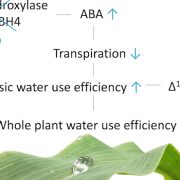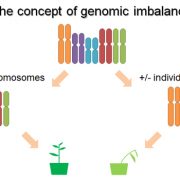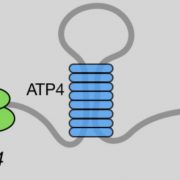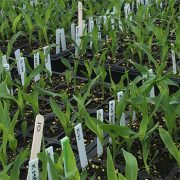18S rRNA processing factors in maize
by Tao Wang and Jun Yang
The National Engineering Laboratory of Crop Resistance Breeding, School of Life Sciences, Anhui Agricultural University, Hefei, China
Background: Every living cell requires ribosomes to produce proteins from amino acids via a process called protein synthesis or translation. A ribosome is a massive, complex structure composed of RNA (rRNA) and many proteins. It is composed of two subunits – the smaller (40S) and the larger (60S). The mRNA binds and is decoded in the 40S subunit and the amino acids are added in the 60S subunit. In plants, the 40S small subunit is composed of various ribosomal proteins and 18S rRNA, while the large 60S subunit contains 5S, 5.8S and 25S rRNAs, in addition to ribosomal proteins. The 5.8S, 18S and 25S rRNAs in maize are transcribed as a single precursor transcript. This precursor rRNA transcript (pre-rRNA) is processed by numerous factors through various pathways.
Question: What are the crucial factors that are involved in the processing of 18S rRNA? What is the outcome if abnormal 18S rRNA maturation occurs during maize kernel development?
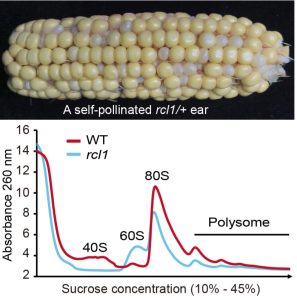
The rcl1 mutant is defective in 40S subunit, 80S ribosome and polysome formation.
Findings: We isolated a maize seed mutant that exhibits arrested embryo differentiation, opaque and shrunken endosperm, and reduced storage protein and starch. We cloned the causal gene and confirmed that it encodes a conserved nucleolar RNA 3’-terminal phosphate cyclase-like protein (RCL1). We showed that RCL1 participated in the processing of 18S pre-rRNA. Consistent with the lower level of 18S rRNA, we found that the amounts of 40S subunit, 80S ribosome and polysomes were reduced in the rcl1 mutant compared with the wild type. Furthermore, we showed that the translation efficiency of key transcription factors for storage protein synthesis and key enzymes for starch synthesis was affected. Therefore, we discovered an essential protein for 18S pre-rRNA processing in maize. The absence of this enzyme disrupted ribosome biogenesis and protein translation during maize kernel development.
Next steps: In order to better elucidate the underlying molecular mechanism of RCL1 in 18S rRNA processing, we will identify the RCL1 associated proteins and other components that are required for 18S rRNA maturation in maize.
Reference:
Tao Wang, Yumei Chang, Kai Zhao, Qing Dong, Jun Yang (2022) Maize RNA 3’-terminal phosphate cyclase-like protein promotes 18S pre-rRNA cleavage and is important for kernel development. Plant Cell. https://doi.org/10.1093/plcell/koac052


